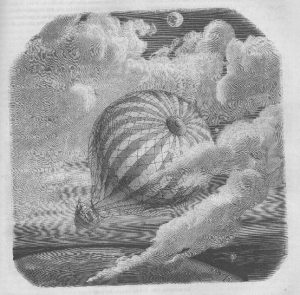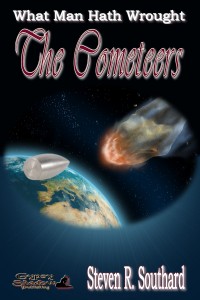Today I’m interviewing the first man to land on the moon. I’m speaking, of course, about Hans Pfaall, who appears in my story “The Unparalleled Attempt to Rescue One Hans Pfaall,” in the anthology Quoth the Raven. It’s my sequel to the Edgar Allan Poe story, “The Unparalleled Adventure of One Hans Pfaall.”
 Poseidon’s Scribe: Greetings, Mr. Pfaall. And welcome to my blog. Thank you for consenting to this interview.
Poseidon’s Scribe: Greetings, Mr. Pfaall. And welcome to my blog. Thank you for consenting to this interview.
Hans Pfaall: Thank you, Mr. Southard. However, I confess I do not know what a ‘blog’ is, nor do I understand how you are able to conduct an interview under these circumstances.
P.S.: Never mind all that. Let’s focus on you. First, am I pronouncing your name correctly? Does Pfaall rhyme with ‘pail’ or ‘ball?’
H.P.: You’re pronouncing it correctly.
P.S.: Um….okay. Let’s move on. Up until five years ago, in 1830, where did you live and work?
H.P.: I was a citizen of Rotterdam. I repaired fireplace bellows.
P.S.: But then you went on a remarkable voyage. Please tell us about that.

H.P.: I constructed a balloon of my own design and used it to travel to the Moon.
P.S.: I can’t believe that. All on your own, with meager resources, you built a balloon?
H.P.: Not on my own. That would be ridiculous. My wife and three men assisted me.
P.S.: How were you able to travel, let alone breathe, in the vacuum of space?
H.P.: You suffer from a widely held misconception. The space between the Earth and its satellite is not a vacuum. Although the air is thin, one can use a compressor apparatus to render it breathable, which I did.
P.S.: I see. Once you reached the Moon, what did you find there?
H.P.: The most significant things were the numerous hamlets and the single sizable city, in which I landed. Also of interest were the natives, who are similar to us in many ways, except for their diminutive stature and their lack of ears. I wrote about all of this in a letter; I gave it to one of the Lunarians and sent him back to Earth in a balloon for delivery to the officials of Rotterdam. Did they not receive it?
P.S.: They did. But your letter ended with some tantalizing mysteries. Please describe those.
H.P.: I presume you’re speaking of the strange connection between every human on Earth and a particular Lunarian. Not only does such twinning exist, unbeknown to us, but the lives and destinies of the linked individuals are interwoven with each other. Moreover, I believe I mentioned in the letter something about the dark and hideous mysteries that lie on the far side of the Moon, the side forever turned away from Earth.
P.S.: Right. Don’t you think those things deserved more than one paragraph?
H.P.: That letter had rambled on too long already. I will write more letters soon.
P.S.: Did you think about the effect such a letter might have on the residents of Rotterdam? I’ve heard they may send a rescue mission.
H.P.: What? I didn’t ask to be rescued. I don’t want to be rescued.
P.S.: You’re happy, staying on the Moon?
H.P.: Quite happy, sir.
P.S.: Well, this is a bit awkward. The rescuers are…um…
H.P.: What do you mean? Are you saying they’re on their way already? Tell them to turn back!
Poseidon’s Scribe: I’m just an author. I don’t have complete control over these things. But, thank you for this fascinating interview.
Hans Pfaall: No, this isn’t over. Promise me you’ll get the rescuers to return home. I don’t want to be rescued! Tell them!
Sheesh. That interview didn’t go exactly as I’d planned. In the anthology Quoth the Raven, you can read the story, “The Unparalleled Attempt to Rescue One Hans Pfaall” written by—
Poseidon’s Scribe

